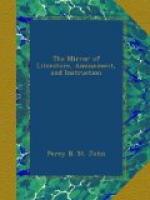If Mozart had not been engaged to compose the carnival opera for Milan, he might have written that for Bologna, Rome, or Naples, as at these three cities offers were made to him, a proof of what his genius had effected in Italy.
* * * * *
The epoch at which Mozart’s genius was ripe may be dated from his twentieth year; constant study and practice had given him ease in composition, and ideas came thicker with his early manhood—the fire, the melodiousness, the boldness of harmony, the inexhaustible invention which characterize his works, were at this time apparent; he began to think in a manner entirely independent, and to perform what he had promised as a regenerator of the musical art. The situation of his father as Kapell-meister, in Salzburg, indeed gave Mozart some opportunities of writing church music, but not such as he most coveted, the sacred musical services of the court being restricted to a given duration, and the orchestra but poorly supplied with singers; it was therefore his earnest desire to get some permanent appointment in which he could exercise freely his talent for composition, and reckon on a sufficient income. When childhood and boyhood had passed away, his quondam patrons ceased to wonder at, or feel interest in, his genius, and Mozart, whose early years had been spent in familiar intercourse with the principal nobility of Europe, who had been from court to court, and received distinctions and caresses unparalleled in the history of musicians, up to the period of his death gained no situation worthy his acceptance, but earned his fame in the midst of worldly cares and annoyances, in alternate abundance and poverty, deceived by pretended friendship, or persecuted by open enmity. The obstacles which Mozart surmounted in establishing the immortality of his muse, leave those without excuse who plead other occupations and the necessity of gaining a livelihood as an excuse for want of success in the art. Where the creative faculty has been bestowed, it will not be repressed by circumstances.
In the exterior of Mozart there was nothing remarkable; he was small in person, and had a very agreeable countenance, but it did not discover the greatness of his genius at the first glance. His eyes were tolerably large and well shaped, more heavy than fiery in the expression; when he was thin they were rather prominent. His sight was always quick and strong; he had an unsteady abstracted look, except when seated at the piano-forte, when the whole form of his visage was changed. His hands were small and beautiful, and he used them so softly and naturally upon the piano-forte, that the eye was no less delighted than the ear. It was surprising that he could grasp so much as he did in the bass. His head was too large in proportion to his body, but his hands and feet were in perfect symmetry, of which he was rather vain. The stunted growth of Mozart’s body may have arisen from




